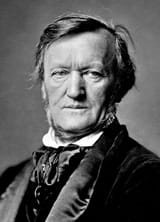>Wagner and Vegetarianism
During Friedrich Nietzsche's visits to Triebschen in 1869 Wagner, who was otherwise impressed by Nietzsche, was scornful of the young professor's commitment to vegetarianism; despite the fact that, under the influence of Mathilde Wesendonk, he had already developed an interest in the rights of animals. Wagner had learned from his mentor Schopenhauer that mankind was a species distinguished from other animals only by our capacities for reason and compassion. It was from sympathy with our fellow-creatures that Wagner progressed towards vegetarianism; although he never became a total vegetarian. He knew the writings of Georg Friedrich Daumer (1800-1875); perhaps he first encountered this poet and philosopher in his translation of poems by Hafiz. Wagner later acquired several of Daumer's books on philosophy and religion, and Cosima's Diaries mention Daumer several times.
Among those books was an account of the foundling Kaspar Hauser, to whom Daumer was tutor. Wagner was struck by Daumer's argument that man's original diet was vegetarian (a view that he had already met in Schopenhauer's Parerga und Paralipomena) and that the moral and physical decline of mankind was the result of the change to an unnatural diet that included meat. Daumer noted that the behaviour of Kaspar Hauser — who in his wild years had only lived on wild fruit and who, in his first few months of captivity, lived on bread and water — deteriorated as soon as the boy was introduced to meat dishes; which at first he refused. Kaspar became unco-operative and, according to Daumer, "the nobility of his nature disappeared". Daumer also wrote of how the adoption of a vegetarian diet had caused an improvement in his own health.



